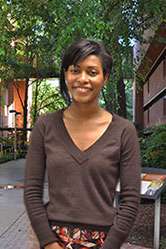Major: Biological Sciences
“The Great Escape: The Effects of Medication and Age on Drosophila Strength”

This research focuses on two medications and their effects on weakness in Drosophila. Frailty is a condition in which particular physical abilities deteriorate with age. There are a number of factors that indicate frailty, but the factor the current experiments will focus on is strength which will be assessed in a Drosophila model. We will look at the independent effects of age and the combined effects of age and medication in order to determine the age at onset of weakness and if the medications delay this age at onset, using virgin male Drosophila. The medications used have been known to increase lifespan in mammals and therefore may directly influence strength. Strength will be assessed at ages one, three, five, seven, and nine weeks. Strength decline is assessed by timing Drosophila escape from a sticky substance. This will enable us to measure the effect of the drug on strength in age-matched flies at several time points during the life span of the fly. In advancing this study, males will be tested to determine if the drugs have sex-specific effects on weakness.
How did you find your mentor for your research project?
I looked on the biological sciences website and e-mailed the professors who had research most closely related to my interest. Dr. Leips emailed back about an interview and I proceeded to visit the lab. Once I expressed interest, he checked for lab space and accepted me as a student.
How did you know this was the project you wanted to do?
I started on an ecology project in my lab under the graduate student Chia-Hua, and though this was an awesome experience. I switched projects after my first full year in the lab. I switched to a project more so related to the medical field because of my aim to earn a DPT/PhD degree.
Is this your first independent research project?
No, I have worked on independent research at my past two summer internships, however this was my first time being very hands on with experimental design, guided by Dr. Leips and Mariann G.
Do you get course credit for this work?
Yes, I get course credit for lab participation.
How much time do you put into it?
From week to week the time varies, but I would say an average of ten hours a week.
How did you hear about the Undergraduate Research Award (URA) program?
One of the older students in my lab received it the year before me and gave a brief description of what it entailed. Dr. Leips also mentioned that it would be a good opportunity.
What academic background did you have before you applied for the URA?
I was a junior biology major with reasonable grades.
Was the application difficult to do?
The application was not difficult it just required thought.
How much did your mentor help you with the application?
My mentor reviewed my application for statement accuracy and typos.
What has been the hardest part about your research?
The hardest part about my research was the experimental design (figuring out how to test certain variables).
What was the most unexpected thing?
The most unexpected thing was the awesome group of people I had the chance to work with while doing the project and the extensive amount of research skills I practiced (ex. Writing, presenting, data analysis, bench work).
How does your research relate to your work in other classes?
Recently, I had a class that was very focused on learning how to read papers, present work, write scientific papers, and construct experiments. Many upper level biology classes center around skills that will benefit a person who wants to be successful in the research world. Therefore having previous research experiences aids students by better preparing them to be able to think differently when it comes to problem solving.
What else are you involved in on campus?
I am also involved in UMBC Varsity cheer, and from time to time I like going to BSU and ASA meetings and activities. I am also involved in scholarship programs that support research (ex. Meyerhoff/MARC/HHMI).
What is your advice to other students about getting involved in research?
I would advise students to start looking for opportunities in labs on campus as early in their UMBC career as possible. Also I would encourage people to keep an open mind when it comes to research topics because there are so many topics in science to experience and an unexpected passion may be found when trying new types of research.
What are your career goals?
My career goal is to become a physical therapist and scientist. I like the flexibility a DPT/PhD degree offers so I would like to take time to teach, practice, and conduct research related to physical therapy one day.
8/22/2014